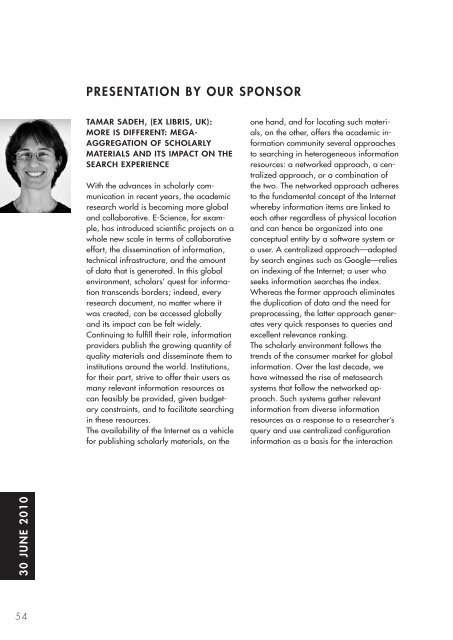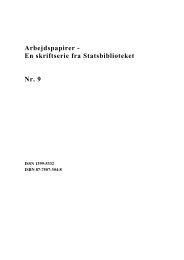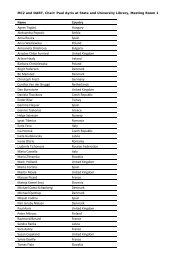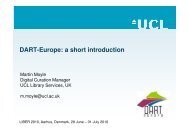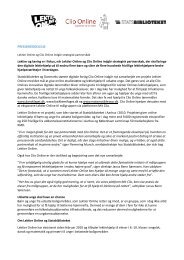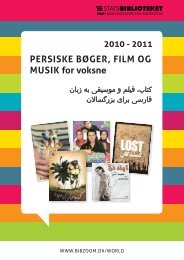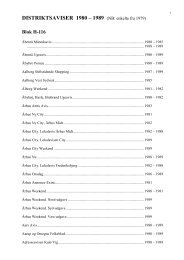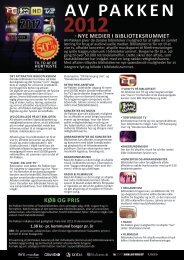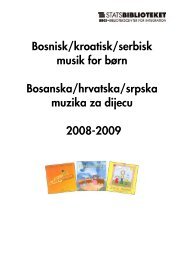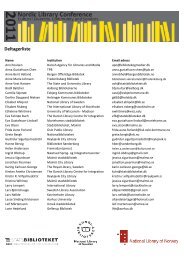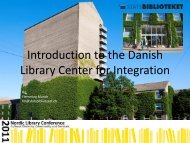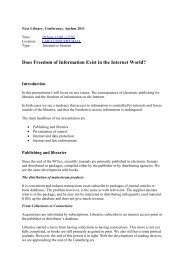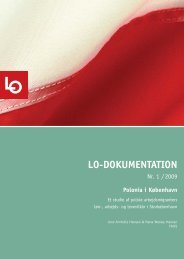LIBER 39TH ANNUAL CONFERENCE - Statsbiblioteket
LIBER 39TH ANNUAL CONFERENCE - Statsbiblioteket
LIBER 39TH ANNUAL CONFERENCE - Statsbiblioteket
Create successful ePaper yourself
Turn your PDF publications into a flip-book with our unique Google optimized e-Paper software.
PREsEntatIon By ouR sPonsoR<br />
tamaR sadEh, (EX LIBRIs, uk):<br />
moRE Is dIffEREnt: mEgaaggREgatIon<br />
of schoLaRLy<br />
matERIaLs and Its ImPact on thE<br />
sEaRch EXPERIEncE<br />
With the advances in scholarly communication<br />
in recent years, the academic<br />
research world is becoming more global<br />
and collaborative. E-Science, for example,<br />
has introduced scientific projects on a<br />
whole new scale in terms of collaborative<br />
effort, the dissemination of information,<br />
technical infrastructure, and the amount<br />
of data that is generated. In this global<br />
environment, scholars’ quest for information<br />
transcends borders; indeed, every<br />
research document, no matter where it<br />
was created, can be accessed globally<br />
and its impact can be felt widely.<br />
Continuing to fulfill their role, information<br />
providers publish the growing quantity of<br />
quality materials and disseminate them to<br />
institutions around the world. Institutions,<br />
for their part, strive to offer their users as<br />
many relevant information resources as<br />
can feasibly be provided, given budgetary<br />
constraints, and to facilitate searching<br />
in these resources.<br />
The availability of the Internet as a vehicle<br />
for publishing scholarly materials, on the<br />
one hand, and for locating such materials,<br />
on the other, offers the academic information<br />
community several approaches<br />
to searching in heterogeneous information<br />
resources: a networked approach, a centralized<br />
approach, or a combination of<br />
the two. The networked approach adheres<br />
to the fundamental concept of the Internet<br />
whereby information items are linked to<br />
each other regardless of physical location<br />
and can hence be organized into one<br />
conceptual entity by a software system or<br />
a user. A centralized approach—adopted<br />
by search engines such as Google—relies<br />
on indexing of the Internet; a user who<br />
seeks information searches the index.<br />
Whereas the former approach eliminates<br />
the duplication of data and the need for<br />
preprocessing, the latter approach generates<br />
very quick responses to queries and<br />
excellent relevance ranking.<br />
The scholarly environment follows the<br />
trends of the consumer market for global<br />
information. Over the last decade, we<br />
have witnessed the rise of metasearch<br />
systems that follow the networked approach.<br />
Such systems gather relevant<br />
information from diverse information<br />
resources as a response to a researcher’s<br />
query and use centralized configuration<br />
information as a basis for the interaction<br />
30 JunE 2010<br />
54


